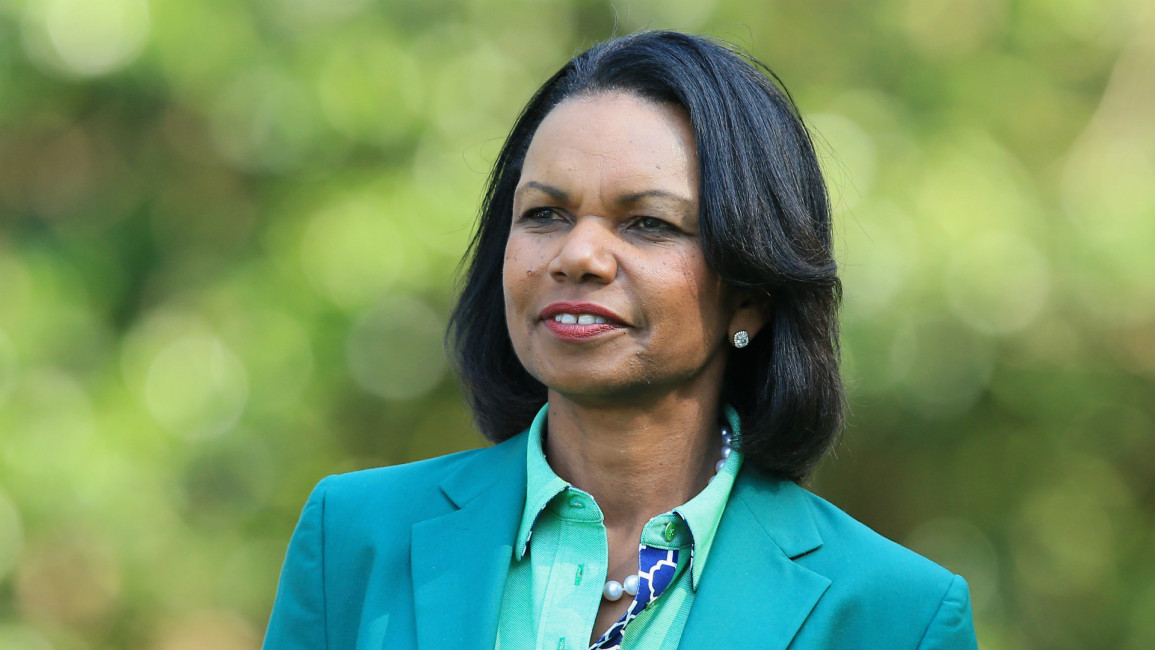
Perpetuating the folly of US foreign policy
Perpetuating the folly of US foreign policy
Comment: How can the US change when politicians and advisers involved in some of the country's worst foreign policy misadventures are teaching in universities, asks Mobashra Tazamal.
3 min read
Condoleezza Rice pushed for the 2003 invasion of Iraq [Getty]
When Condoleezza Rice was announced as the College of William & Mary's 2015 commencement speaker, I was shocked.
Commencement speakers are invited to share their advice, values and experiences with students, many of whom will become the future of the US.
It seems American universities have short memories. Rice was last year forced to withdraw from a commencement speech at Rutgers following a student-led protest over her hand in the disastrous Iraq invasion and torture policies.
The relationship between academia and the US government is no secret. Many university professors have at some point served as legal advisers to the president and other departments of the government. Some even move into politics, and then return to academia when their terms expire.
Rice served as the national legal adviser and secretary of defence under George W Bush, and was a strong proponent of the invasion of Iraq, a foreign policy objective that was based on fabricated evidence and had no basis in international law.
Since then, more than 600,000 civilians have been killed in Iraq. Sectarian war, instability, a failed state and the rise of the Islamic State group are the legacy of this US intervention.
Fallujah has higher levels of infant mortality and cancer than Hiroshima, which many attribute to the US use of depleted uranium shells and white phosphorous.
Those behind this disastrous invasion have never been held accountable. While Bush is painting pictures of dogs, Rice is teaching political economy and political science at Stanford University in California, and speaking at William & Mary's.
The transition from politician to lecturer is not limited to the Bush administration.
Harold Koh once served as a legal adviser to Barack Obama on his drone policies.
Drone strikes are conducted by the CIA, in areas that are not declared war zones, and where any military-aged man killed or injured is listed as a "combatant". The Bureau of Investigative Journalism states that 3,000 people have died in such strikes, among them a wedding party and a 16-year-old US citizen. Obama recently apologised for the deaths of two westerners accidentally killed by a drone strike.
Human rights organisations have said the policy as advised by Koh breaks international human rights law and arguably promotes war crimes.
Koh now teaches international human rights law at New York University.
Looking back through recent history, US policy on the Middle East has remained relatively unchanged. Perhaps these transitions from policy-maker to educator go some way to explaining why.
Politicians and advisers who involved themselves in some of the most disastrous US adventures of the last decade are now influencing the next generations. How can policy change if the teacher remains the same?
Commencement speakers are invited to share their advice, values and experiences with students, many of whom will become the future of the US.
It seems American universities have short memories. Rice was last year forced to withdraw from a commencement speech at Rutgers following a student-led protest over her hand in the disastrous Iraq invasion and torture policies.
The relationship between academia and the US government is no secret. Many university professors have at some point served as legal advisers to the president and other departments of the government. Some even move into politics, and then return to academia when their terms expire.
Rice served as the national legal adviser and secretary of defence under George W Bush, and was a strong proponent of the invasion of Iraq, a foreign policy objective that was based on fabricated evidence and had no basis in international law.
Since then, more than 600,000 civilians have been killed in Iraq. Sectarian war, instability, a failed state and the rise of the Islamic State group are the legacy of this US intervention.
Fallujah has higher levels of infant mortality and cancer than Hiroshima, which many attribute to the US use of depleted uranium shells and white phosphorous.
| While Bush is painting pictures of dogs, Rice is teaching political economy and political science at Stanford University in California. |
Those behind this disastrous invasion have never been held accountable. While Bush is painting pictures of dogs, Rice is teaching political economy and political science at Stanford University in California, and speaking at William & Mary's.
The transition from politician to lecturer is not limited to the Bush administration.
Harold Koh once served as a legal adviser to Barack Obama on his drone policies.
Drone strikes are conducted by the CIA, in areas that are not declared war zones, and where any military-aged man killed or injured is listed as a "combatant". The Bureau of Investigative Journalism states that 3,000 people have died in such strikes, among them a wedding party and a 16-year-old US citizen. Obama recently apologised for the deaths of two westerners accidentally killed by a drone strike.
Human rights organisations have said the policy as advised by Koh breaks international human rights law and arguably promotes war crimes.
Koh now teaches international human rights law at New York University.
Looking back through recent history, US policy on the Middle East has remained relatively unchanged. Perhaps these transitions from policy-maker to educator go some way to explaining why.
Politicians and advisers who involved themselves in some of the most disastrous US adventures of the last decade are now influencing the next generations. How can policy change if the teacher remains the same?




